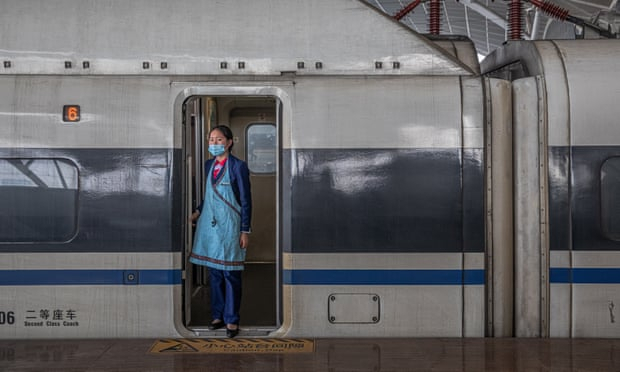According to the study of antibody prevalence, the infection rate was also far higher in Wuhan than surrounding areas, suggesting the virus had been well contained in the city where the outbreak first began.
The study, conducted by the Chinese Center for Disease Control and Prevention (CDC), tested for antibodies in blood serum samples from around 34,000 people in Wuhan and other Hubei province cities, as well as the cities of Beijing and Shanghai and the provinces of Guangdong, Jiangsu, Sichuan and Liaoning.
According to the CDC’s statement, the researchers found an antibody rate of 4.43% among the population of Wuhan, home to about 11 million people. The suggested infection of more than 487,000 people vastly outstrips the 50,354 officially reported cases.
The city of Wuhan was put under an extraordinary 76-day lockdown on 23 January, which was replicated in varying forms in other Hubei cities, putting an estimated 56 million people under effective quarantine.
The CDC said antibody rates were far lower outside of Wuhan, only 0.44% in other Hubei cities, and only two individuals identified as carrying antibodies among the more than 12,000 tested outside Hubei.
“The survey results show that the population of our country is generally at a low level of infection, indicating that the epidemic control, with Wuhan as the main battlefield, has been successful and effectively prevented the large-scale spread of the epidemic,” it said.
The CDC’s findings added to previous reports suggesting infection rates in China were higher than reported.
In April authorities revised Wuhan’s fatality count upwards by 50%, which it said was the result of incorrect or delayed reporting and not because information had been suppressed.
Also in April, a study by Hong Kong academics noted the initial diagnostic criteria for identifying the disease was very narrow, and was repeatedly revisited as new information about the disease became available and as laboratory testing capacity was expanded. That study estimated more than 232,000 people may have been infected in the first wave of Covid-19 in mainland China, four times the official figures.
The recording and reporting of officials case numbers was fraught in numerous countries, but China in particular was accused of lacking of transparency, and has targeted doctors and journalists who tried to spread information about the outbreak. The World Health Organisation is sending a fact finding mission to Wuhan in the new year, with other government’s including Australia pushing for it to be robust and independent.
The CDC’s study was published online on Monday, but does not appear to have been published in any peer-reviewed journals. Its results align with local media reports in May, that seroepidemiological sampling surveys had found a “higher than expected” antibody rate of 5-6% among 11,000 people in Wuhan. The study didn’t specify exactly when the survey was conducted, but said it was one month after the first wave of outbreaks.
Life in much of China, including Wuhan, has largely returned to normal but authorities continue to battle sporadic outbreaks. Health authorities reported 27 new cases on Tuesday, up from 21 the day before. It included 15 local transmissions in Beijing and Liaoning, where several districts are under emergency measures to stop the outbreaks.
Authorities have also enacted new travel restrictions ahead of the lunar new year, the region’s most important holiday which sees widespread travel and tourism. The Spring festival, which saw around 415m domestic trips in 2019, runs from 28 January to 8 March.
Local authorities have urged people limit gatherings, and keep their travel to nearby areas. Public servants and employees at state-owned companies in Beijing were asked to show an example and stay in the city during the holiday period, Beijing party chief Cai Qi said last week, according to the Global Times.
The Guardian
More about: #Wuhan
















































